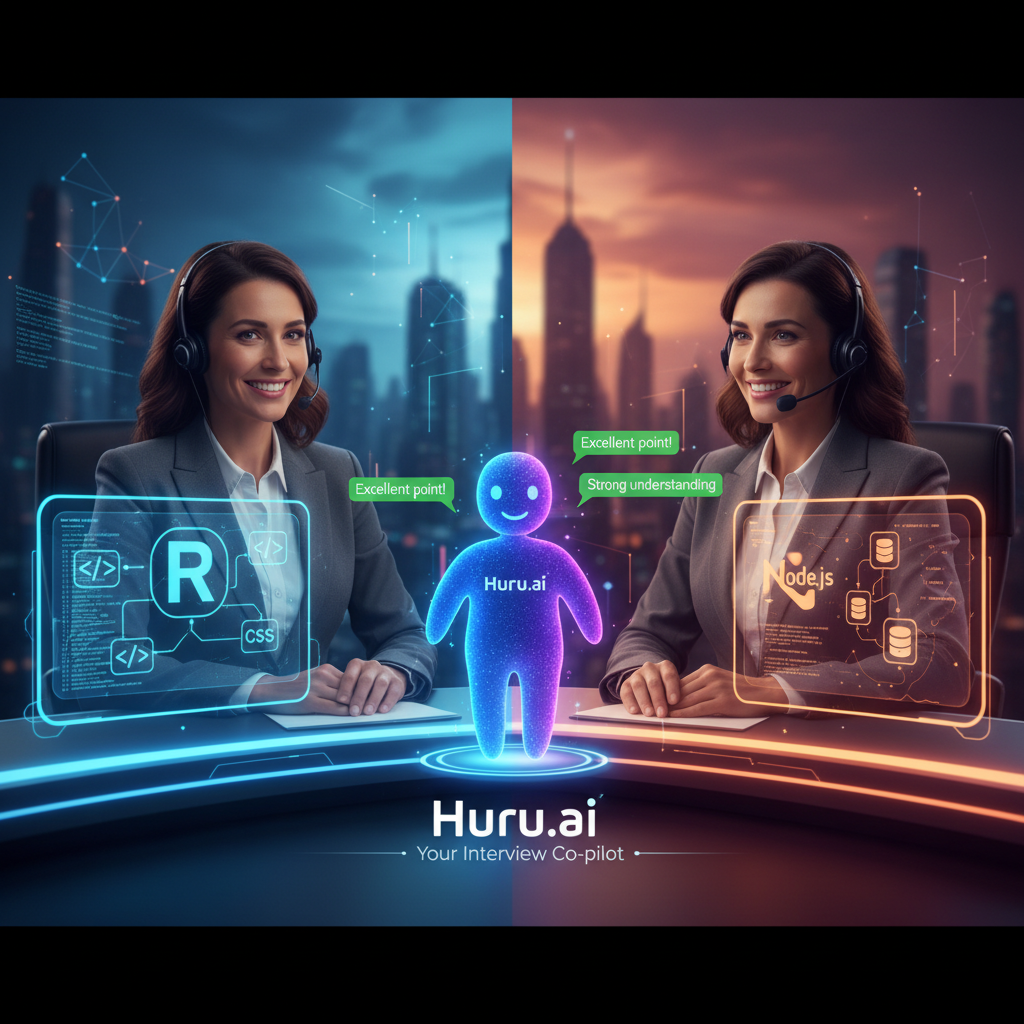Full Stack Developer Interview Questions (2025): Conquer Both Sides with Huru.ai


Practice unlimited interviews with Huru.ai, receive instant, actionable feedback, and boost your confidence—all for free. Start practicing now →
The Full Stack Challenge in 2025: What Interviewers Want
In 2025, full stack developer interviews have evolved well beyond the basics. Employers now expect candidates to demonstrate not only deep technical expertise in both frontend and backend, but also the ability to design scalable systems, implement DevOps, and collaborate seamlessly across teams. Are you ready for the challenge? This guide will help you understand the latest trends, most-asked questions, and proven strategies to stand out—with a special focus on how Huru.ai can fast-track your interview mastery.

Decoding Job Descriptions: Aligning Your Skills to Land the Interview 🚀
Before you even send your application, your real interview starts with the job description. Companies seek full stack engineers with a tailored blend of technical and soft skills. Analyze the posting for:
- Core technologies: (e.g., React, Angular, Node.js, Python, Java, SQL/NoSQL databases)
- Architecture expertise: (microservices, REST, GraphQL, containerization)
- DevOps and cloud skills: (Docker, Kubernetes, AWS, CI/CD pipelines)
- Soft skills: (collaboration, communication, agile, problem-solving)
Make connections between your experience and the company’s needs. Prepare STAR stories (Situation, Task, Action, Result) to demonstrate you’re the perfect fit. Huru.ai can help you practice tailoring your answers for maximum impact.
💡 Key Takeaway
Don’t just memorize buzzwords! Match specific job requirements to your real-world achievements—and use Huru.ai to role-play these scenarios with instant, AI-powered feedback.
Must-Know Technical Questions: Frontend, Backend, and Beyond
- Frontend (React, Angular, Vue):
- Describe the virtual DOM and how React reconciles changes.
- What is server-side rendering (SSR) and why is it important in 2025?
- How do you optimize a large SPA for performance and accessibility?
- Explain advanced state management (Redux, Context API, hooks).
- How do you ensure accessibility (WCAG compliance) in your frontend?
- Backend (Node.js, Python, Java):
- Explain REST vs GraphQL. When would you use each?
- Describe a microservices architecture and its benefits/drawbacks.
- What are JWTs and how do you implement stateless authentication?
- How do you handle concurrency and scaling in your backend?
- Walk through designing a CI/CD pipeline for deployment.
- Database & DevOps:
- Compare SQL (PostgreSQL) vs NoSQL (MongoDB): strengths and use-cases.
- How do you optimize slow database queries?
- What is containerization? How do Docker and Kubernetes fit in modern deployment?
- System Design:
- How would you design a scalable chat application?
- What caching strategies would you use for high-traffic APIs?
- How do you ensure observability (logging, monitoring, tracing) in production?
Advanced Interview Topics for 2025: What Sets You Apart 🎯
Don’t stop at the basics! Interviewers are increasingly probing areas such as:
- Microservices orchestration & serverless patterns (with Docker, Kubernetes, AWS Lambda)
- GraphQL APIs and N+1 query optimization
- Progressive Web Apps (PWAs) and offline-first architectures
- Security best practices—from OAuth2 to rate limiting and API gateways
- CI/CD automation, blue-green deployments, and infrastructure as code
- Performance profiling: frontend bundle analysis, backend caching, database indexing
- Behavioral and soft skills: Agile methodologies, cross-team collaboration, conflict resolution
To master these, you need more than static Q&A. Huru.ai lets you simulate high-stakes scenarios and get feedback on your technical communication, troubleshooting, and system design thinking—all areas where most candidates struggle. Read more about backend technical mastery here.
💡 Key Takeaway
In 2025, the difference between good and great full stack candidates is mastery of modern architectures, DevOps, and the ability to explain your decisions clearly. Practice these with Huru.ai’s unlimited, scenario-based interview simulations.
Practice Makes Perfect: How to Use Huru.ai for Interview Mastery
- Sign up free at Huru.ai.
- Select “Full Stack Developer” interview and your preferred difficulty.
- Practice unlimited mock interviews—covering frontend, backend, system design, and behavioral questions.
- Receive instant, actionable feedback on:
- Answer structure & clarity
- Technical depth (specific tech, architecture, security)
- Communication, confidence & non-verbal cues
- Track your progress, identify weak spots, and repeat until you build real confidence!
With unlimited practice and real-time feedback, Huru.ai is the smart way to move from anxious to interview-ready. Try a frontend developer mock interview or a mobile developer session too!
💡 Key Takeaway
No matter your experience level, the path to full stack mastery is deliberate, targeted practice—with feedback. Huru.ai makes this simple, effective, and even fun!
Common Q&A: Real Interview Scenarios & Best Answers
Let’s tackle some of the “People Also Ask”-style questions that show up in real interviews and on Google. Use these as a base for your mock sessions in Huru.ai:
| Question | Best Practice Answer |
|---|---|
| What is the difference between REST and GraphQL? | REST exposes multiple endpoints, follows HTTP methods strictly, and returns fixed data shapes. GraphQL exposes a single endpoint and gives clients flexibility to query exactly the data they need, making it ideal for complex frontend needs. |
| How do you secure a full stack application? | Use HTTPS, secure authentication (OAuth2/JWT), validate inputs, sanitize data, set up CORS correctly, implement rate limiting, monitor logs, and regularly update dependencies. |
| What’s your process for debugging a slow web application? | Profile frontend bundles, check for blocking scripts, analyze API latency, review database indexes, and use monitoring tools to pinpoint bottlenecks. Prioritize fixes by user impact. |
| How do you stay updated with new tech frameworks? | Follow official documentation, engage with developer communities (Stack Overflow, GitHub), attend webinars, and experiment with new stacks in side projects. |
| Describe a challenging system design you solved. | E.g., Designed a scalable chat platform using WebSockets, Redis for pub/sub, sharded databases, and deployed via Docker Swarm. Prioritized horizontal scaling and fault tolerance. |
Want more sample answers? Explore our backend Q&A guide.
Video Guide: 2025’s Full Stack Interview Essentials
This highly-rated video covers everything from technical questions to behavioral strategies. Pair it with unlimited practice on Huru.ai for unbeatable preparation.
Resources & Next Steps: Level Up Your Full Stack Journey
- Frontend Developer Interview Questions Build A Strong Impression
- Mobile App Developer Interview Questions Showcase Your Mobile Expertise
- Backend Developer Interview Questions Master The Server Side With Huru Ai
- Backend Developer Interview Questions Master Server Side Challenges
Continue building your expertise by exploring these focused guides and practicing daily with Huru.ai. The journey from competent to unshakeably confident begins now.
About the Author
Elias Oconnor is a seasoned content writer at Huru.ai, passionate about translating complex tech hiring trends into actionable career guidance. He combines industry expertise with a knack for making learning engaging and practical—helping job seekers unlock their full potential, one interview at a time.


 Jul 11,2024
Jul 11,2024  By Elias Oconnor
By Elias Oconnor